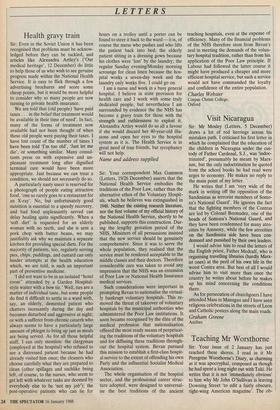LETTERS Health gravy train
Sir: Even in the Soviet Union it has been recognised that problems must be acknow- ledged before they can be tackled, and articles like Alexandra Artley's ('Our medical heritage', 12 December) do little to help those of us who wish to see geruine progress made within the National Health Service. It is easy to flick through a few advertising brochures and score some cheap points, but it would be more helpful to consider why so many people are now turning to private health insurance.
We are told that (old people) 'have paid taxes . . . in the belief that treatment would be available in their time of need'. In fact, many of the forms of treatment now available had not been thought of when these old people were paying their taxes. I have lost count of the number of times I have been told 'I'm too old', 'Just let me die', or something similar. Many consul- tants press on with expensive and un- pleasant treatment long after dignified terminal care would have been more appropriate. Just because we can treat a condition, we should not necessarily do so.
A particularly nasty sneer is reserved for a photograph of people eating attractive food, 'one so rarely goes to a restaurant for an X-ray'. No, but unfortunately good nutrition is essential to a speedy recovery, and bad food unpleasantly served can delay healing quite significantly. When a 'soft diet' is requested for an elderly woman with no teeth, and she is sent a pork chop with butter beans, we may justifiably ask why we maintain a separate kitchen for providing special diets. For the majority of patients, too, regularly serving pies, chips, puddings, and custard can only hinder attempts at the health education which, we are told, is such an important part of preventive medicine.
'I did not want to be in an isolated "hotel room" attended by a Garden Hospital- style waiter with a bow tie.' Well, ties are a matter of individual taste, but some people do find it difficult to settle in a ward with, say, an elderly, demented patient who chatters incessantly during the day and becomes disturbed and aggressive at night; or with a sufferer from chronic catarrh who always seems to have a particularly large amount of phlegm to bring up just as meals are being served. As for all those helpful staff, I can only mention: the clergyman (employed at the hospital) who refused to see a distressed patient because he had already visited him once; the cleaners who choose carefully what they are prepared to clean (other spillages and suchlike being left, of course, to the nurses, who seem to get left with whatever tasks are deemed by everybody else to be 'not my job'); the post-operative patients who can lie for hours on a trolley until a porter can be found to steer it back to the ward — it is, of course the nurse who pushes and who lifts the patient back into bed; the elderly patient sitting in a dressing gown because his clothes were 'lost' by the laundry; the regular Sunday evening/Monday morning scrounge for clean linen because the hos- pital works a seven-day week and the laundry only works five. I could go on.
I am a nurse and work in a busy general hospital. I believe in state provision for health care and I work with some truly dedicated people, but nevertheless I am surrounded by evidence the the NHS has become a gravy train for those with the strength and ruthlessness to exploit it. Alexandra Artley would do us all a favour if she would discard her 40-year-old illu- sions and open her eyes to the hospital system as it is. The Health Service is in great need of true friends, but sycophancy will not help.
Name and address supplied


















































 Previous page
Previous page